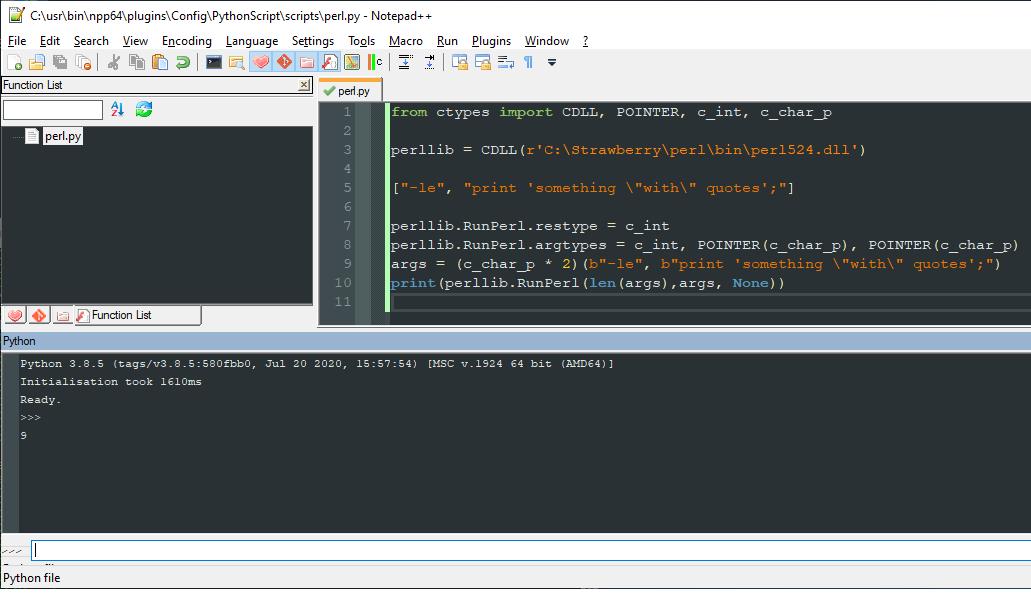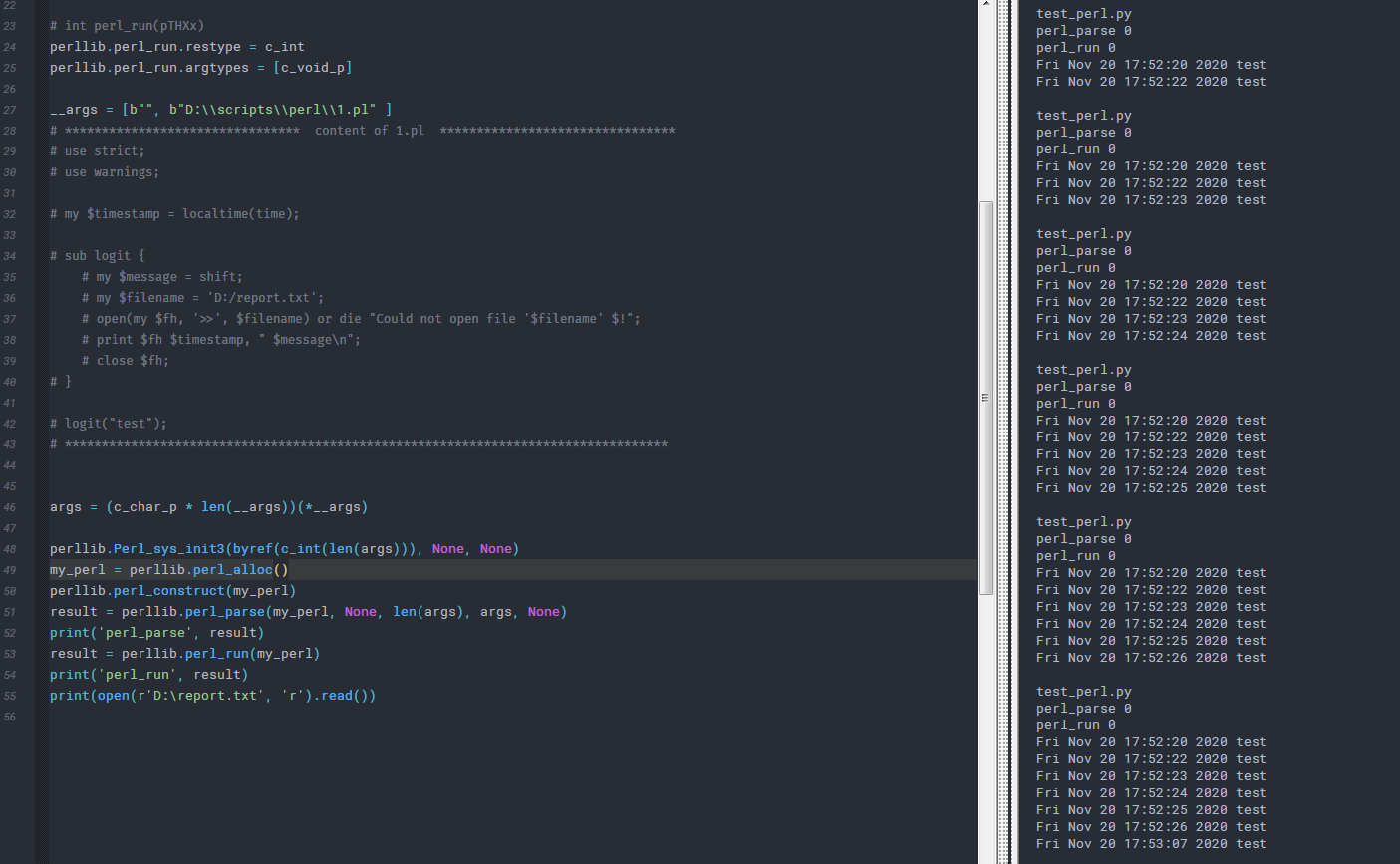Perl subroutine calltips - with PythonScript
-
The other thing I realized: you probably won’t have all the prerequisite modules installed. I normally use the cpanm utility, which distributes with strawberry perl, and that automatically downloads and installs prereqs before the module you’re trying to install. Without such a tool (and if you built your own perl, which I think you did to get the DLL), I don’t know that you have that.
I think the make process will tell you what prereqs you’re missing … but it’s been a long time since I’ve done a complicated manual install of a module.
Oh, yep, there, you posted the error while I was typing. You’re going to have to install at least Win32::API first… doing that manually is a pain.
When you built your own perl, did you at least get cpan, if not cpanm? I think one or both would be in the same directory as perl.exe… if you have cpanm, just do
cpanm Win32::Mechanize::NotepadPlusPlus, and everything should work. If you have just cpan, I forget whether it handles prereqs; trycpan Win32::Mechanize::NotepadPlusPlus; if that’s not sufficient, do the missing prereqs one at a time with thecpanclient. If you have neither… um… That’s going to be tough. -
@PeterJones said in Perl subroutine calltips - with PythonScript:
If you have just cpan, I forget whether it handles prereqs
I believe it does - I normally just use CPAN and it fetches what I need to build.
Cheers.
-
I have cpan and it keeps installing stuff - did I choose to install the world??
-
it does this now since ~10 minutes
-
finished - but no Win32::API. started cpan Win32::API now.
-
Is there a reason you build your own Perl? I have Strawberry 5.24 installed and doing this works:

That’s @Ekopalypse script from above using my “system” Strawberry Perl 5.24 DLL (the Perl that has my Win32::Mechanize::NotepadPlusPlus and all my other stull installed on it). Not sure why it’s printing “9” in the PythonScript console - is that what it’s supposed to do? I thought I’d get that string
"print something ...Cheers.
-
I get also 9 and from the function it seems correct to return an int.
See my previous post. RunPerl returns only an int. Not sure how to get the result (the print output), so far. -
@Ekopalypse said in Perl subroutine calltips - with PythonScript:
I get also 9
Oh, OK - great then. Seems I may be able to keep testing along without having to build a Perl and just use my Strawberry install.
Cheers.
-
My Win32::API has been built but not installed because of failing tests I guess. Can you try the
"use Win32::Mechanize::NotepadPlusPlus qw/:main/; notepad->newFile();"and see what happens? -
This post is deleted! -
@Ekopalypse said in Perl subroutine calltips - with PythonScript:
Can you try
from ctypes import CDLL, POINTER, c_int, c_char_p perllib = CDLL(r'C:\Strawberry\perl\bin\perl524.dll') ["-le", "use Win32::Mechanize::NotepadPlusPlus qw/:main/; notepad->newFile();"] perllib.RunPerl.restype = c_int perllib.RunPerl.argtypes = c_int, POINTER(c_char_p), POINTER(c_char_p) args = (c_char_p * 2)(b"-le", b"use Win32::Mechanize::NotepadPlusPlus qw/:main/; notepad->newFile();") print(perllib.RunPerl(len(args),args, None))It just prints
9in the PythonScript console. No new tab is opened. If I run the command itself from a prompt:C:\ > perl -e "use Win32::Mechanize::NotepadPlusPlus qw/:main/; notepad->newFile();"I get a new tab in Notepad++ as expected.
At least if it printed
42we’d know we’re on to something …Cheers.
-
Ja, 42 would be nice :-)
So 9 seems to be an error code. -
Can you try one more thing?
Replace the RunPerl call with this
print(perllib.RunPerl(len(args), args, (c_char_p * 1)(b'')))
With the newFile code, please. -
Same 9.
I tried both:
from ctypes import CDLL, POINTER, c_int, c_char_p perllib = CDLL(r'C:\Strawberry\perl\bin\perl524.dll') ["-e", "use Win32::Mechanize::NotepadPlusPlus qw/:main/; notepad->newFile();"] perllib.RunPerl.restype = c_int perllib.RunPerl.argtypes = c_int, POINTER(c_char_p), POINTER(c_char_p) args = (c_char_p * 2)(b"-e", b"use Win32::Mechanize::NotepadPlusPlus qw/:main/; notepad->newFile();") print(perllib.RunPerl(len(args),args,(c_char_p * 1)(b"use Win32::Mechanize::NotepadPlusPlus qw/:main/; notepad->newFile();")))and
from ctypes import CDLL, POINTER, c_int, c_char_p perllib = CDLL(r'C:\Strawberry\perl\bin\perl524.dll') ["-e", "use Win32::Mechanize::NotepadPlusPlus qw/:main/; notepad->newFile();"] perllib.RunPerl.restype = c_int perllib.RunPerl.argtypes = c_int, POINTER(c_char_p), POINTER(c_char_p) args = (c_char_p * 2)(b"-e", b"use Win32::Mechanize::NotepadPlusPlus qw/:main/; notepad->newFile();") print(perllib.RunPerl(len(args),args,(c_char_p * 1)(b'')))HOWEVER … this:
from ctypes import CDLL, POINTER, c_int, c_char_p perllib = CDLL(r'C:\Strawberry\perl\bin\perl524.dll') ["use Win32::Mechanize::NotepadPlusPlus qw/:main/; notepad->newFile();"] perllib.RunPerl.restype = c_int perllib.RunPerl.argtypes = c_int, POINTER(c_char_p), POINTER(c_char_p) args = (c_char_p * 1)(b"use Win32::Mechanize::NotepadPlusPlus qw/:main/; notepad->newFile();") print(perllib.RunPerl(len(args),args,None))produces
0in the PythonScript console.Cheers.
-
Ok, I should have installed strawberry perl in first place, solved all my issues.
First success
from ctypes import CDLL, POINTER, c_int, c_char_p perllib = CDLL(r'D:\strawberry\perl\bin\perl532.dll') perllib.RunPerl.restype = c_int perllib.RunPerl.argtypes = c_int, POINTER(c_char_p), POINTER(c_char_p) __args = [b"", b"-le", b"use Win32::Mechanize::NotepadPlusPlus qw/:main/; notepad->newFile();"] args = (c_char_p * len(__args))(*__args) x = perllib.RunPerl(len(args), args, None) print(x)This works, but only one time. A second call results in a
OSError: exception: access violation writing 0x0000000000000024Seems some cleanup needs to be done afterwards.
-
@Ekopalypse said in Perl subroutine calltips - with PythonScript:
Seems some cleanup needs to be done afterwards.
Yes, in my late night Google-ing I saw lots of references to
free(args)after theRunPerl()call.Examples:
https://comp.lang.perl.misc.narkive.com/r7M6eENL/dll-unload-question-for-embedded-perl-on-windows
https://www.nntp.perl.org/group/perl.wxperl.users/2017/01/msg9715.htmlCheers.
-
@Ekopalypse said in Perl subroutine calltips - with PythonScript:
__args = [b"",…Weird. If I don’t have the empty zeroth argument, the call fails (x==9). I wonder why it needs the blank argument…
-
@PeterJones said in Perl subroutine calltips - with PythonScript:
I wonder why it needs the blank argument…
I read some stuff on Par::Packer and it seems the first argument may be the optional path to the
perlexecutable.https://oliverbetz.de/pages/Artikel/Portable-Perl-Applications
Cheers.
-
Hmm … it looks like freeing the interpreter is the issue.
I tried to replicate what RunPerl is doing and when I use thisfrom ctypes import CDLL, POINTER, c_int, c_char_p, c_void_p, byref perllib = CDLL(r'D:\strawberry\perl\bin\perl532.dll') # perllib.RunPerl.restype = c_int # perllib.RunPerl.argtypes = [c_int, POINTER(c_char_p), POINTER(c_char_p)] # Perl_sys_init3(int* argc, char*** argv, char*** env) perllib.Perl_sys_init3.argtypes = [POINTER(c_int), POINTER(POINTER(c_char_p)), POINTER(POINTER(c_char_p))] # PerlInterpreter * perl_alloc(void) perllib.perl_alloc.restype = c_void_p perllib.perl_alloc.argtypes = [] # void perl_construct(pTHXx) perllib.perl_construct.argtypes = [c_void_p] # int perl_parse(pTHXx_ XSINIT_t xsinit, int argc, char **argv, char **env) # only 4 params ?? perllib.perl_parse.restype = c_int perllib.perl_parse.argtypes = [c_void_p, c_void_p, c_int, POINTER(c_char_p), POINTER(c_char_p)] # we need 5 params according to RunPerl # int perl_run(pTHXx) perllib.perl_run.restype = c_int perllib.perl_run.argtypes = [c_void_p] __args = [b"", b"D:\\scripts\\perl\\1.pl" ] # ******************************** content of 1.pl ******************************** # use strict; # use warnings; # my $timestamp = localtime(time); # sub logit { # my $message = shift; # my $filename = 'D:/report.txt'; # open(my $fh, '>>', $filename) or die "Could not open file '$filename' $!"; # print $fh $timestamp, " $message\n"; # close $fh; # } # logit("test"); # ********************************************************************************** args = (c_char_p * len(__args))(*__args) perllib.Perl_sys_init3(byref(c_int(len(args))), None, None) my_perl = perllib.perl_alloc() perllib.perl_construct(my_perl) result = perllib.perl_parse(my_perl, None, len(args), args, None) print('perl_parse', result) result = perllib.perl_run(my_perl) print('perl_run', result) print(open(r'D:\report.txt', 'r').read())I can run 1.pl multiple times

-
I guess I have a working “embedded” perl instance.
from ctypes import CDLL, POINTER, c_int, c_char_p, c_void_p, byref perllib = CDLL(r'D:\strawberry\perl\bin\perl532.dll') # Perl_sys_init3(int* argc, char*** argv, char*** env) perllib.Perl_sys_init3.argtypes = [POINTER(c_int), POINTER(POINTER(c_char_p)), POINTER(POINTER(c_char_p))] # PerlInterpreter * perl_alloc(void) perllib.perl_alloc.restype = c_void_p perllib.perl_alloc.argtypes = [] # void perl_construct(pTHXx) perllib.perl_construct.argtypes = [c_void_p] # int perl_parse(pTHXx_ XSINIT_t xsinit, int argc, char **argv, char **env) # only 4 params ?? perllib.perl_parse.restype = c_int perllib.perl_parse.argtypes = [c_void_p, c_void_p, c_int, POINTER(c_char_p), POINTER(c_char_p)] # we need 5 params according to RunPerl # int perl_run(pTHXx) perllib.perl_run.restype = c_int perllib.perl_run.argtypes = [c_void_p] # int perl_destruct(pTHXx) perllib.perl_destruct.restype = c_int perllib.perl_destruct.argtypes = [c_void_p] # SV* Perl_eval_pv(pTHX_ const char *p, I32 croak_on_error) perllib.Perl_eval_pv.restype = c_void_p perllib.Perl_eval_pv.argtypes = [c_void_p, c_char_p, c_int] # # SV * Perl_sv_pv(pTHX_ const IV i) perllib.Perl_sv_pv.restype = c_char_p perllib.Perl_sv_pv.argtypes = [c_void_p, c_void_p] __args = [b"", b"-e", b"0"] # test_npp args = (c_char_p * len(__args))(*__args) perllib.Perl_sys_init3(byref(c_int(len(args))), None, None) my_perl = perllib.perl_alloc() perllib.perl_construct(my_perl) if perllib.perl_parse(my_perl, None, len(args), args, None) == 0: for perlcode in [b"reverse 'rekcaH lreP rehtonA tsuJ'", b"$a = 3; $a **= 2", b"$a = 3; $a **= "]: val = perllib.Perl_eval_pv(my_perl, c_char_p(perlcode), 0) print(perllib.Perl_sv_pv(my_perl, val)) else: print('Perl interpreter setup error.') print(perllib.perl_destruct(my_perl))Next step would be to identify errors (see last example code)
and make additional modules working. I assume this has something
to do with the @INC …
and of course make a class out of it for easy reuse.